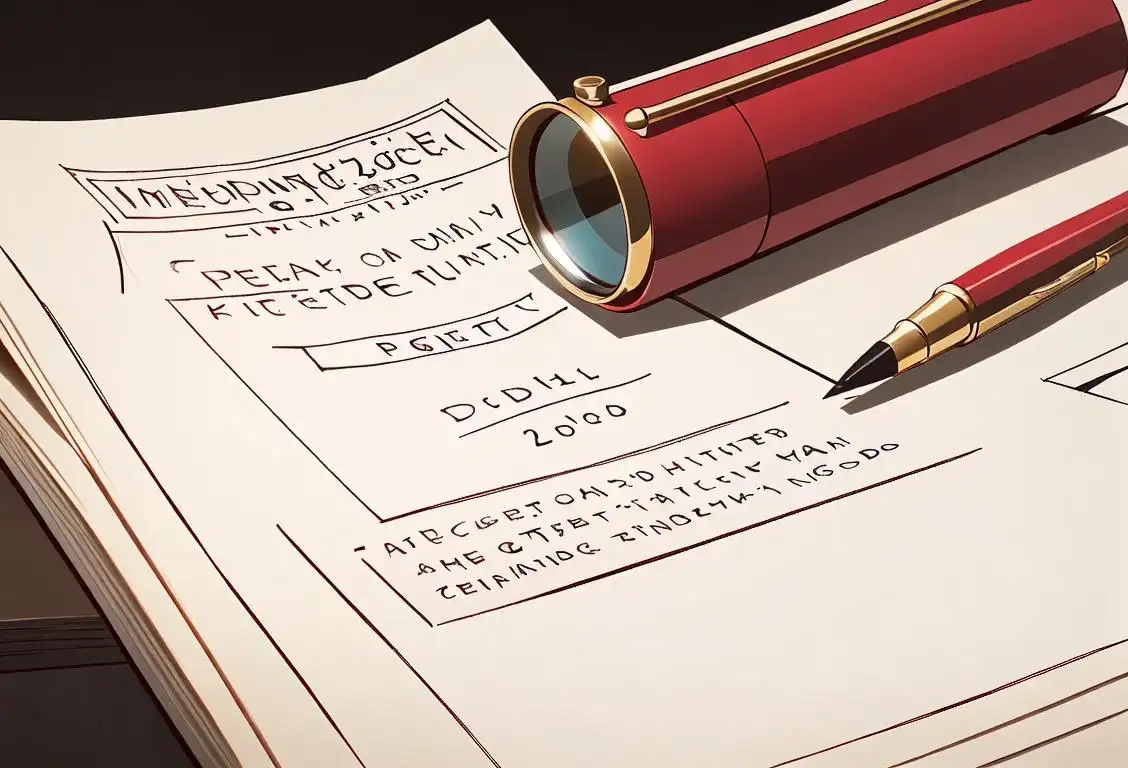National Pedantry Day

Welcome to National Pedantry Day! Get ready to dive into the meticulous world of nitpicking, where grammar police, fact-checkers, and sticklers unite. This national day celebrates the art of being pedantic, because it's not just about being a know-it-all; it's about being an attention-to-detail mastermind. So, grab your red pen and magnifying glass, and let's explore the history and significance of National Pedantry Day.
When is Pedantry Day?
It's national pedantry day on the 25th January.
What is National Pedantry Day?
National Pedantry Day is a lighthearted celebration that honors pedantry in all its glory. It's a day to embrace our inner perfectionist and revel in the joy of pointing out every teeny-tiny error we come across. Whether it's correcting someone's grammar, fact-checking a Wikipedia article, or informing your friend that a tomato is technically a fruit (not a vegetable), National Pedantry Day encourages us to be meticulous in our pursuit of accuracy.
The Origins of Pedantry
Pedantry has a long and illustrious history, dating back to ancient times. The word itself comes from the Latin word 'pedantus,' which means 'a schoolmaster, tutor, or pedagogue.' In the Middle Ages, pedants were highly regarded for their knowledge and attention to detail.
In the digital age, pedantry has found fertile ground on the internet. Social media platforms and comment sections have become veritable battlefields for people armed with autocorrect and encyclopedic knowledge. Whether it's an innocent typo, a poorly researched statement, or a misused semicolon, pedants can't resist the urge to swoop in and set the record straight.
How to Celebrate National Pedantry Day
Ready to unleash your inner pedant? Here are a few fun ways to celebrate National Pedantry Day:
- Host a grammar quiz: Gather your friends and see who reigns supreme in the grammar department. Remember, there's no room for spelling errors or misplaced commas!
- Start a fact-checking spree: Dive deep into the rabbit hole of questionable claims on the internet and become the ultimate fact-checking hero.
- Send gentle corrections: Politely point out errors you encounter throughout the day. Just remember to be tactful and avoid coming across as a know-it-all.
Remember, the goal is to have fun while indulging in your pedantic side. Spread the love for accuracy like confetti, but never forget that kindness and understanding should be at the heart of your corrections.
History behind the term 'Pedantry'
1589
The Origin of the Term
The term 'pedantry' can be traced back to the year 1589. It originated from the French word 'pedant', which referred to a teacher or schoolmaster. The term was used to describe an individual who was overly concerned with formalism and adherence to rules and regulations.
17th Century
Rise of Pedantry in Academia
During the 17th century, pedantry became closely associated with the academic world. Scholars and academics developed a reputation for focusing more on learning and knowledge for its own sake rather than its practical application. Pedants were often seen as being preoccupied with minute details and placing a higher value on the pursuit of knowledge over its practical application.
18th Century
The Age of Enlightenment and Pedantry
In the 18th century, pedantry continued to play a significant role within intellectual circles. The Age of Enlightenment, characterized by a focus on reason, science, and intellectual progress, provided fertile ground for pedantic individuals to flourish. However, the term began to acquire negative connotations as pedants were seen as rigid, dogmatic, and overly concerned with minutiae.
19th Century
Pedantry in Literature
During the 19th century, pedantry became a subject of exploration in literature. Writers like Charles Dickens and George Eliot depicted pedantic characters to critique the rigid adherence to rules and intellectual snobbery prevalent in society. Through their works, they highlighted the negative consequences of pedantry and its impact on both individuals and society.
20th Century
Pedantry in Modern Context
In the 20th century, the term 'pedantry' continued to be used to describe individuals who excessively focus on details and display a superior attitude. However, as society became more diverse and interconnected, the negative connotations associated with pedantry started to shift. Pedantry began to be acknowledged as a symptom of elitism and gatekeeping in various domains, including academic, professional, and cultural spheres.
Present Day
Balancing Knowledge and Practicality
In the present day, the concept of pedantry is viewed with a more nuanced perspective. While a dedication to knowledge and attention to detail are still valued, there is an increased emphasis on practical application and the ability to communicate effectively. The term 'pedantry' serves as a reminder to strike a balance between deep understanding and the ability to convey knowledge in a meaningful and accessible way.
Did you know?
Did you know that pedantry is often fueled by the desire for perfection and an unwavering commitment to accuracy? It may seem like nitpicking, but for pedants, every misplaced comma, misspelled word, or factual inaccuracy is a personal challenge to set things right!Tagged
awareness funFirst identified
25th January 2021Most mentioned on
25th January 2021Total mentions
7Other days
Nurses Day
Former Prisoner Of War Recognition Day
Press Day
Handloom Day
Heroes Day
Memorial Day
Dance Day
Bestfriends Day
Liberation Day
Love Your Pet Day









